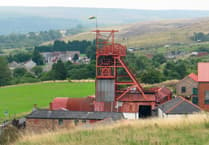THE Big Pit National Coal Museum in Blaenavon is to play a pivotal role in making Wales “anti-racist” and to provide a “decolonized” picture of the past that takes into account “historical injustices.”
In a bid to make diversity mandatory, the Welsh government has mandated that heritage sites such as the 140-year-old former coal mine must find and use teaching material that “tell stories through the lens of black, Asian and minority experiences."
Under plans by the Welsh government to set “the right historic narrative,” museums such as Big Pit must provide an “authentic and decolonized account of the past, one that recognises both historical injustices and the positive impact of ethnic minority communities.”
The official guidance states that all Welsh museums “will have some evidence of colonial and imperial trade and wealth.”
Although the links between Big Pit and colonialism may not be at first apparent, museums have been urged to unearth materials linked to “slavery and empire” in order to make their visitor experience “more relevant to an increasingly diverse Wales.”
The guidance complies with the Labour Government’s 2022 “Anti-Racist Wales Action Plan, which seeks to ensure heritage bodies have “redesigned the historical narrative.”
A statement by Museum Wales reads that the new requirements and guidance will, “Help us make well-informed decisions about existing and future commemorations in public spaces, and in doing so, contribute to our goal of an anti-racist Wales.
“As Wales’s family of national museums and a publicly-funded organisation, we have a responsibility to address the challenges that confront Wales today.
“We believe that culture in Wales should reflect the lives of all its citizens and be accessible to all.”
Leader of the Welsh Conservatives, Andrew RT Davies, has slammed the proposals and told The Telegraph, “Our Welsh heritage doesn’t need to be decolonized to appease the wholly woke Labour Welsh Government.
“The problem lies in Labour ministers promoting an Orwellian new curriculum that is ‘not based solely on facts’, which is as ridiculous as it sounds.
“Don’t forget, Labour in Wales is Keir Starmer’s ‘blueprint’ for government. These proposals stand as a stark warning to the whole UK.”

Initially, there were thought to be no black miners working in the Welsh collieries, but in 2020 Historian Norma Gregory told the BBC that after a “very hard, long search” she found evidence that suggested there were about 200 black miners in Wales from the 1800s onwards.
Four years ago former Cardiff City FC legend and Wales international footballer Nathan Blake presented a documentary on the little-known history of black miners in Wales.
Blake told the BBC, “I'm a very proud Welshman - wearing red for my country I've shown that Wales isn't made up of just one colour,
"But I feel that black miners tell us more about a multi-cultural Wales than a black footballer."
He added, “It's about understanding how we are in a minority, how black people have been made to accept racism as everyday life if they wanted to get on in life.
"It's more in the background (now), but back in those days, it was prevalent everywhere. You couldn't leave the mine and go and work in the supermarket, because it was there as well."
Garrey Mitchell was one of the thousands of black miners who worked down the UK’s pits from the 1950s onwards.
He first went underground at Gelding Colliery in Nottingham in 1975 as a lad of 17 and told The Guardian, “We were very united down there. You had to be. You had to watch each others’ backs. Colour didn’t come into it. We were all on one level."





Comments
This article has no comments yet. Be the first to leave a comment.